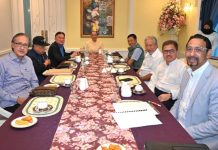Kalabakan MP, Ma’Mun Sulaiman was talking rubbish when he alleged that the previous state government legalised logging through the NT customary land grant or the NT communcal grant.
The objectives of issuing NT Communal Grants through the amendment of section 76 of the Sabah Land Ordinance in 2009 were to:
1. Protect the interest of natives on State Land in the vicinity of native village settlement
2. Expedite the issuance of land title typed Native Title/Field Register to native enbloc
3. Resolve the NCR claim issues
4. Resolve overlapping Land Applications
5. Ensure that Natives do not easily sell off their land.
According to the records, the Land and Survey Department successfully issued 62 Communal Grants with a total area of 83,006 acres (33,591 hectares) through the Strategic Land Acquisition (Fast Track) between 2010 and 2013.
The total beneficiaries (landowners) consisting of natives (in-situ villagers) is 8,039 from 155 villages in 10 districts (Tongod, Kinabatangan, Keningau, Nabawan, Sipitang, Kota Marudu, Pitas, Ranau, Tenom, and Labuk- Sugut).
To develop the land, the landowners/beneficiaries have two options either to do it through a joint-venture or on their own.
If the beneficiaries chose to develop the land themselves, the Land and Survey Department would conduct lot survey through the Mobile Native Unit or PANTAS.
If there are timber that can be logged and sold, the application must go through the Forestry Department.
This shows that the Kalabakan MP had lied to the people of Sabah and slandered the BN government under the leadership of Tan Sri Musa Aman.
Customary land is not a forest reserve area but refers to sites that have been cultivated by applicants for generations for agriculture.
The category of customary land is not included in the forest reserve area.
The definition of a forest reserve is an uninhabited area far from the settlement of the population whereas customary land is a residential area.
Why did Sabah’s forest area increase? It happened because the previous state government did not issue new logging licences whereas existing licences were allowed to expire.
This showed that Kalabakan MP had lied when he claimed that Sabah forest reserve area increased because it covers the people’s customary land areas.
The previous administration led by Tan Sri Musa Aman paid great attention to forest management.
Serious efforts were made towards creating healthy and productive forests within the forest reserves, each having its own management plans.
For areas that are not fully protected, logging was carried out sustainably while high conservation valued (HCV) areas were well maintained, in line with the various values found within the areas including water catchment areas.
Through Sustainable Forest Management (SFM), a total of 53 per cent of Sabah or an area of 3.9 million hecatres of State Land is designated as Permanent Forest Reserves, Protected Areas and Wildlife Conservation Areas.
The State government had also allocated 30 per cent of Sabah’s total rainforest area or 2.2 million hectares as Totally Protected Areas (TPA) which it had hoped to achieve in the next five years or sooner.
This number also surpassed the 10 per cent target set by the International Union for Conservation of Nature (IUCN).
One thing to note, the previous State government had restored and replanted more than 600,000 hectares of forest, believed to be the largest area for this purpose in any tropical rainforest areas.
The government at the time also promoted Sabah as a tropical rainforest research hub, attracting international research organisations such as The Royal Society of the United Kingdom, The Nature Conservancy of the United States of America, Yayasan Sime Darby, Yayasan Abraham, WWF-Malaysia IKEA and Petronas, as well as other major local institutions of higher learning.
In this regard, the Kalabakan MP needs to be honest by explaining the real definitions of permanent forest reserves to the people and not confuse them with political terms.
The forest reserves definitions are recognised internationally.
It was impossible for the government to gazette areas as forest reserves if such areas did not possess forest plants. If that was what the Kalabakan MP from Warisan meant, it was akin to saying that the Sahara Desert has a permanent forest. Even if Warisan does not want to acknowledge the extraordinary achievements of the previous government in resolving native customary land issues in Sabah, they should not resort to lying and slander. Enough is enough.
The Warisan government is only reaping what the Barisan Nasional government led by Tan Sri Musa Aman sowed in the issuance of customary land grants as the BN government faced delays in surveying the lands for decades due to shortages in funding and manpower.
Realising the constraint, the previous state government held talks with the BN federal government.
The federal government accepted and agreed to the proposal by Musa-led state government. Following that, the federal government had allocated RM20 million a year since 2011 for survey work carried out through PANTAS.
Starting in 2011, survey works on customary lands were greatly accelerated.
It cut the time to prepare and issue land grants. And the current chief minister only needed to hand over the titles to the applicants after all the hard work was done decades before.
As such, Shafie is only ‘riding’ on the effort and hard work of the previous state government. It is nothing more than taking credit for other people’s work as the process of handing over customary land titles to applicants is done continuously until the Land and Survey Department resolved all the applications.
We could check the handing over of land titles against existing data. For example, by the end of 2017, a total of 36,137 hectares (90,343 acres) of customary lands have been surveyed.
The titles for these areas cover all corners of Sabah.
However, lately, Shafie seems to be moving around Sabah to complete the handing over of the land titles.
He did so without even the slightest embarrassment, even claiming that the grants were made possible because of Warisan government.
The fact is, the process of issuing the land titles began in 2011, long before they can be handed over to the applicants. In truth, since the end of 2017, land titles for 90,000 acres of native lands were actively processed to be handed over to eligible applicants.
*Datuk Osman Jamal*
Balung Assemblyman /
Former Director of the Department of Lands and Surveys,
Tawau,
August 14,2020.
ENDS






